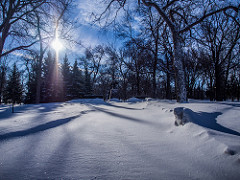By JON THOMPSON
desire
In the flat uninhabited spaces, snow falls from an empty sky. Here and there, the bare branches of an oak are black against the steadily-falling flakes. When the air is thick with them, it’s not white, exactly, but a glowing bluish-white, shading to grey as evening comes on, darkness in tow. Snow accumulates like loneliness, one snowfall covering the last one, layering into snowdrifts that become the landscape.
naïveté
The landscape is cruel in its monotony, in its lethality. Cleverness here can lead to intolerable frustration. Better to cultivate a good-humored disposition to living in the here-and-now, becoming a connoisseur of the quotidian. Naïveté may be thought of as a form of regional loyalty, in which a seemingly-naïve individual elects to embrace a culture lacking in prestige. It’s possible that a naïf may be best suited to interpreting signs; it’s possible that those regarded as naïve may evidence genius.
silence
Genius of the winter sun is that it makes the cold white expanses theatrical. Every sound happens between silences; silence is the default condition of the land. Sudden noises, mechanical noises, appear to violate something like a primeval natural compact. For many, the long silences punctuated by soughing winds are unendurable, a Nordic torment that goes with the long darkness, the deep cold. In a land defined by long silences, there are no successful lies.
death
Lies, unworthy of the earth, lie buried in the snow, intact until snowmelt. The fields, the trees, the sky, the heart-clenching cold—even the ice sheeting the highway blacktop—exist as a reminder of the imminence of death: domain of the high, shiny, blue-black, earth-scanning things. Death makes us statuary. Though few seek it, everyone finds the white gift of oblivion. Everyone forced to forge new paths of exile through an unknown land.
Jon Thompson edits Free Verse: A Journal of Contemporary Poetry & Poetics and the single-author poetry series Free Verse Editions.
[Purchase your copy of Issue 05 here]



